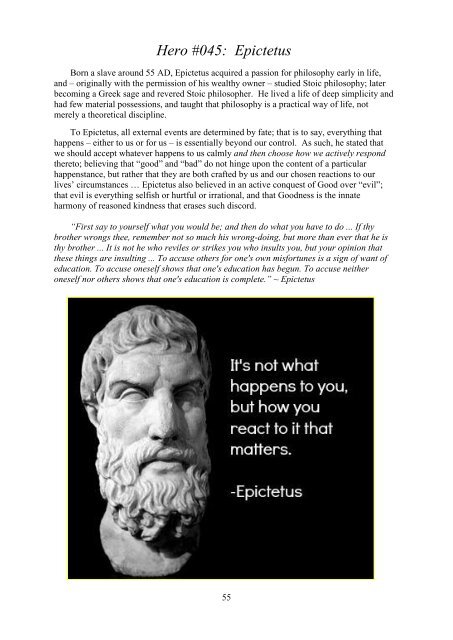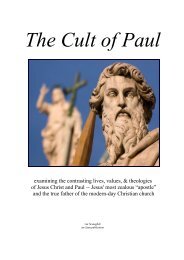In LOVE with Humanity
A tribute to some of humanity’s greatest Heroes; 153 men & women who have chosen, via their brave words &/or noble deeds, to reflect the deeper Greatness residing within us all
A tribute to some of humanity’s greatest Heroes; 153 men & women who have chosen, via their brave words &/or noble deeds, to reflect the deeper Greatness residing within us all
You also want an ePaper? Increase the reach of your titles
YUMPU automatically turns print PDFs into web optimized ePapers that Google loves.
Hero #045: Epictetus<br />
Born a slave around 55 AD, Epictetus acquired a passion for philosophy early in life,<br />
and – originally <strong>with</strong> the permission of his wealthy owner – studied Stoic philosophy; later<br />
becoming a Greek sage and revered Stoic philosopher. He lived a life of deep simplicity and<br />
had few material possessions, and taught that philosophy is a practical way of life, not<br />
merely a theoretical discipline.<br />
To Epictetus, all external events are determined by fate; that is to say, everything that<br />
happens – either to us or for us – is essentially beyond our control. As such, he stated that<br />
we should accept whatever happens to us calmly and then choose how we actively respond<br />
thereto; believing that ―good‖ and ―bad‖ do not hinge upon the content of a particular<br />
happenstance, but rather that they are both crafted by us and our chosen reactions to our<br />
lives‘ circumstances … Epictetus also believed in an active conquest of Good over ―evil‖;<br />
that evil is everything selfish or hurtful or irrational, and that Goodness is the innate<br />
harmony of reasoned kindness that erases such discord.<br />
―First say to yourself what you would be; and then do what you have to do ... If thy<br />
brother wrongs thee, remember not so much his wrong-doing, but more than ever that he is<br />
thy brother ... It is not he who reviles or strikes you who insults you, but your opinion that<br />
these things are insulting ... To accuse others for one's own misfortunes is a sign of want of<br />
education. To accuse oneself shows that one's education has begun. To accuse neither<br />
oneself nor others shows that one's education is complete.‖ ~ Epictetus<br />
55

















